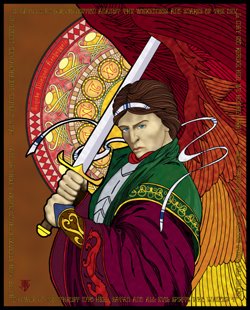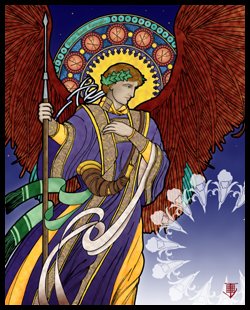Now to get us all in the mood for angelic conversation on Monday, here is a feature story from Joan Wester Anderson's newest book, chosen for us by the author herself.
Mary’s Mantle
All things bright and beautiful,
All creatures great and small,
All things wise and wonderful,
The Lord God made them all.
—Cecil Frances Alexander, “All Things Bright and Beautiful”
When bombs fell out of the sky on Sunday morning, December 7, 1941, Pearl Harbor, Hawaii, was not the only city to suffer. Many areas in the Philippine Islands were also hit, including the city of Baguio. Baguio was a place of pine trees and mountains, surrounded by fields and gold mines, where Lolo Joaquin worked as an engineer. Lolo’s family, all devout Catholics, had spent the weekend visiting him at the mining site, and everyone was driving home to Baguio for Mass when they heard the bombs exploding. Terrified, the family turned the car around and sped back to the relative safety of the camp. For the next several months, they and many others, stayed near Itogon at a mission run by Father Alfonso, a Belgian priest and longtime friend.
Lolo had graduated from the Colorado School of Mining and had American friends, so as the Japanese army invaded city after city, he became involved in the resistance movement. He refused to work in the copper mines, knowing the metal would be turned into bullets used against his friends. His wife, Lola, smuggled messages inside loaves of freshly baked bread to American prisoners in concentration camps. But both knew it was just a matter of time before the Japanese made inroads into more distant areas, and discovered their activities.
Early in October 1942, as monsoon season began, word spread that Japanese soldiers were heading in their direction. “We’ll go deeper into the mountains, to Dalupiri,” Father Alfonso told the families that had been staying with him. They could hide among the Benguet tribe, whose kings were sympathetic to their plight.
The journey began early in the day, but Lolo soon realized that, for his family, passage was going to be difficult. Not only were the Joaquins traveling with four young children, but Lola had recently had a miscarriage and was still very weak. As miles passed and the trails became rockier, she often stumbled and fell. Other families tried to help, and Lolo knew that his was holding the rest of them back. With the Japanese on their heels, this could be disastrous for everyone.
“Go on ahead,” he finally told Father Alfonso. “We’ll catch up.”
Father nodded reluctantly. “We’ll send people back to help carry Lola as soon as we can,” he promised. “God go with you.”
“And you.”
Soon their friends were gone. Frightened, everyone looked at one another. “Daddy, it’s starting to rain.” Nine-year-old Patricia glanced anxiously at the sky.
Lolo followed her gaze. Clouds were gathering, and the sun had dropped, leaving a chill in the air. “Come,” he said, lifting baby Sonny into his piggyback sling. “Everything will be all right.”
But it wasn’t long before the wind picked up and rain pelted the little group. Soon everyone was soaked. The baby whimpered, and seven-year-old Teresita jumped as the trees swayed, whispering ominously. Lola grew increasingly exhausted. The monsoons had begun. How could they go on?
Soon the trail became so narrow that it could only accommodate one person at a time. To the right rose the cliff-side, straight up, stony and forbidding. To the left a precipitous chasm dropped to the overflowing river. The rain continued, pounding them as they struggled to stay upright on the slippery bluff. Finally Lolo stopped. “We’ll sit now,” he said calmly, although Patricia had seen the worry on his face before the last of the light faded. “Your mother needs to rest.”
Slowly the family put down their packs and sat against the rocks. It was dark now, Lolo realized. Even worse, somewhere in the last mile or two, he had lost his way. What should he do? His little ones were exhausted—how could they continue across those treacherous cliffs, especially as night fell? But they couldn’t sleep on the mountainside either, not with these heavy rains and soldiers trying to ambush them.
The wind grew wilder, and soon Lolo stood up again. “Perhaps we should crawl,” he suggested. “One hand on the ground and the other on the wall of the mountain for guidance.”
“Why don’t we light a torch, Daddy?” Buddy asked.
“We can’t, son,” Lolo explained. “The enemy might see it and shoot us.”
Teresita began to cry. “I’m scared, Daddy,” she sobbed as thunder rolled across the mountains. “I want to go home!”
“Hush,” he soothed her, patting her with one hand as he held the sobbing baby in the sling. “Stop crying, my little ones. This is not a good place to be caught by darkness and rain, but we must make the best of it. This situation calls for courage, not fear!”
“What can we do?” Lola asked, drawing four-year-old Buddy close to her.
Lolo paused. “We can pray,” he said. “Haven’t we always turned to heaven when things got bad?”
The children nodded. They had all read prayers from books, or recited those they had been taught. Of course they could pray. But now their father threw out his hands and lifted his voice in a way they had never heard before. “Cover us with thy mantle, oh Blessed Mother of God,” he pleaded, “that we may be saved from all evil and temptation, and from all dangers of body and soul!”
It was a wonderful petition. It had power and hope, and their terror seemed to recede, just a little. Lolo felt it, too. “I have an idea,” he said slowly. “It is too dark now to see ahead, but if we go in single file, each taking the hand of the person in front, we will all feel safer.”
Teresita wanted to be brave. But she trembled as the river beneath them roared. “I’m afraid, Daddy.”
Her father grasped her wet hand. “We will say the rosary as we walk, loud, so God can hear it over the storm! Buddy, you lead the way because you are the smallest and closest to the ground. Is everyone ready?”
“Ready.” Slowly the little group moved forward, water streaming into their eyes, clothes plastered to their shivering bodies. They would not make it. One child would trip, and all would lose their balance, plunging to the canyon below. “Hail Mary, full of grace.” Shakily they clung to the familiar biblical phrases, the reassuring cadence, the memory of their father’s impassioned plea. They would not make it. And yet . . .
The journey seemed to last forever. But as they approached a sharp turn in the path, Buddy was the first to see. “Mama! Daddy!” he shouted. “Look!”
The rain had abruptly stopped, the air seemed sweetly fragrant. And before them, as far as they could see, stretched a long line of luminous candles winding around the curve of the mountain and on to a wide plain. But no—not candles. For these lights were bouncing, dancing, twinkling like stars illuminating the heavens.
They were fireflies! Thousands, millions of them, all hovering about three feet from the ground. In their combined greenish glow, Lolo could see the path as bright as day, even the footprints of the refugees who had gone ahead of them.
Awed, Lola dropped to her knees in thanksgiving. The children laughed, catching some of the little insects and wrapping them in their handkerchiefs. “We can use them for lanterns!” Patricia cried, delighted.
Clutching the baby, Lolo stared at the scene, incredulous. In all his life he had never seen such a huge collection of fireflies in the same place, or massed in a precise pattern like this. Fireflies didn’t come during monsoon season. Nor did they hover close to the ground, preferring
instead the tops of trees. Yet here, hip-high, were an incredible number, waiting for his family, enclosing them—like a mantle of protection, he realized suddenly. A queen’s mantle, edged with gold.
There were more miles to go, but now the path seemed enchanted as the blessed fireflies lighted their way to the little village. Finally! They ran the last muddy yards and pounded on Father Alfonso’s door.
“We had given you up for lost!” the astonished priest cried, coming out to embrace them. “How did you do it? How did you cross the mountains in the dark, in this raging storm?” Patricia and Teresita looked up. The deluge had started again.
“Father, we can’t explain it,” Lolo said. “Look behind us and see this miracle for yourself.”
Father looked past Lolo. But there was nothing at all to see. No fireflies, no softened sky—nothing but darkness and streaming water. Lolo understood. “Has it been raining like this all evening, Father?” he asked quietly.
“It has not stopped at all, Mr. Joaquin,” Father Alfonso answered.
The following day, Father Alfonso called a meeting of the tribal elders, some of them over one hundred years old, and showed them the fireflies left in Teresita’s handkerchief. “Have any of you heard of this?” he asked. “Fireflies coming in a storm to light a traveler’s path?”
The elders conferred. They were experts on the ways of nature, and fireflies. There was no possibility of such a thing, they all agreed.
Such a verdict did not matter to the Joaquins. For they had seen, not only with physical eyes but the eyes of faith. Life would be difficult as they struggled to survive in their war-torn land. But they would not be alone. How wonderful were the ways of God!













